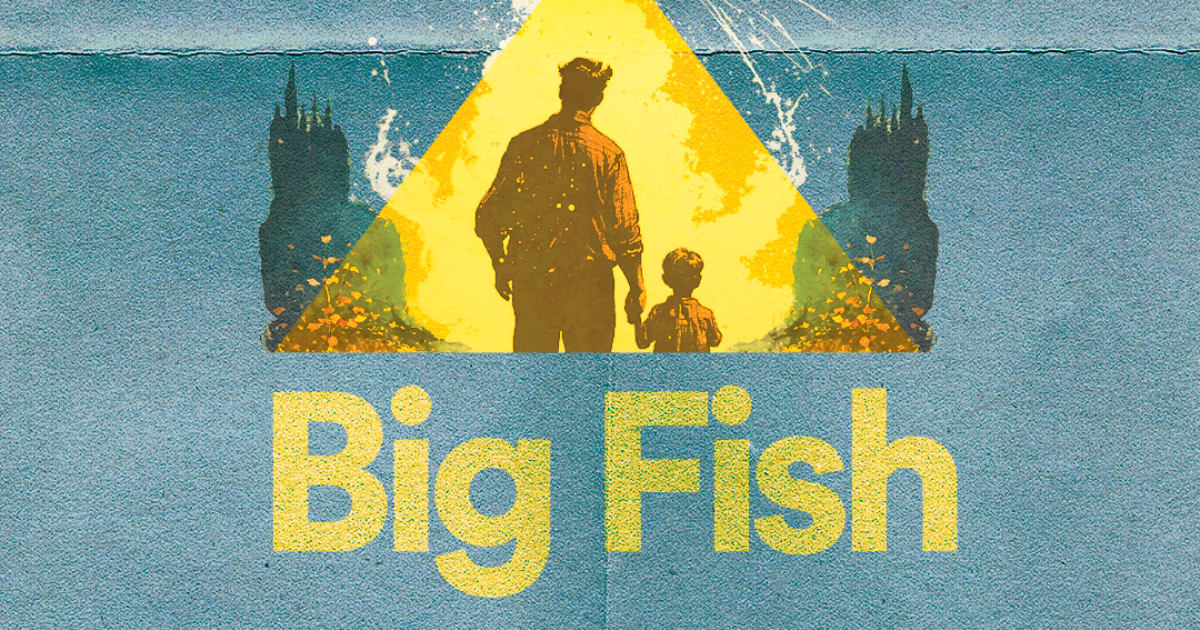“If you’re going to have a story, have a big story or none at all,” wrote Joseph Campbell, the writer responsible for popularizing the hero’s journey as central to myth making and storytelling as we know it, and it’s advice taken to heart by Edward Bloom, the tall-tale teller central to the fantastical musical “Big Fish”, currently in production at Hope Repertory Theatre.
The fantastical elements of this tale are both central and problematic. A major criticism of the initial 2013 Broadway production was its grand scale and the disconnect between the spectacle and the characters, the situation and the story. But at HRT, directed by James Gray, the spectacle is simplified, the cast and musical numbers scaled back; this production relies largely on the audience’s imagination to summon the grandiosity of how a largely absent father’s tall tales shaped his little boy’s world and aspirations.
However, this show still effectively features a river that’s home to the mermaid (Paige Lang) who gave Edward Bloom his first kiss, an agoraphobic giant (Micah Hamstra), a circus master who’s really a werewolf (Chip DuFord), and natural disasters. It’s all fanciful fodder for the central tension of this ultimately sweet story about generational legacy and a father and son who struggle to truly understand one another.
The musical, with music and lyrics by Andrew Lippa and book by John August, is based on Daniel Wallace’s 1998 novel and the 2003 Tim Burton film. Will Bloom is a young reporter eager to understand the truth of who his father is despite his tall tales. Through a dual chronology—the present of his father’s illness and impending death as well as the birth of Will’s first child along with all the spectacular stories Will’s father told him throughout his life that ultimately reveal the family history—Will comes to understand some important and surprising truths about his father, his tall tales, and what they’ve meant for Will.
On the HRT stage Eric Gutman’s Edward Bloom indeed successfully comes off as self-aggrandizing, the hero of all his stories, so much so that he’s a convincing narcissist who can’t seem to create space for anyone else in the room. He is an excellent singer, and his character arc from young to old man and how that affects everyone else is the most important part of the show; however, here he’s a bold old man from start to finish, only changing physically and emotionally at the very end.
The audience’s sympathy therefore lies more prominently with the characters around him: Michael G. Floriano’s Will Bloom is warm and played with heart, as is Christine Hope’s Sandra Bloom, Will’s mother and the unfailingly loyal love of Edward’s life, despite neither one having much chemistry with Gutman, whose performance largely lacks intimate connection with those for whom the stakes are high. It’s a big part with a big story to tell, but it doesn’t fully land when the hero lacks palpable emotional vulnerability. His strongest scene is with Lea Sevola as his high school sweetheart Jenny Hill, wherein he simultaneously saves the day and lets her down.
There are other bright spots in this production. Despite tempo problems with the orchestra (conducted by Music Director Philip DeYoung) and issues with microphones opening night (sound design by Andrew Hill), the singing from the leads is strong and many of the songs memorable, particularly the big opening and closing “Be the Hero” as well as Floriano’s sentimental “Stranger” and Hope’s love song “I Don’t Need a Roof”.
Technical elements in this scaled-back production are a mixed bag. Eric Van Tassell’s lighting effectively creates shifts in time on the minimal set by Stephen Hudson-Mairet and quick scene changes executed effectively by the actors. Anna Hill’s costumes help define a wild variety of characters, though the grandfatherly costume for Gutman prohibits necessary shifts in age and character and Abby Hall’s wigs are largely fake and unflattering—perhaps a nod to the unbelievability of those tall tales, but it’s hard to tell.
“Big Fish” is a celebration of storytelling and the ways stories and those who tell them are inseparable and profoundly shape us regardless of their truth. Despite this production’s shortcomings, these central themes come across, and by the end of the show it’s impossible not to be moved by this remarkable story. Tall tales and self mythologizing or not, the beautiful, grand truth of love and human experience shine through in the bright spots.
Big Fish
Hope Repertory
June 28-Aug. 3
https://hope.edu/offices/hope-summer-repertory-theatre/on-stage/





